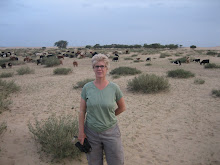That's what the Haitian lady said on the bus, the one who is from Cap Haitien but who has lived in Atlanta for 25 years. She grew up in Haiti under the Duvalier reign and reported that it was wonderful. What we hear in the US are the reports and rumors of the reign of terror of Papa Doc and Baby Doc, how they would simply kill those they thought were any sort of threat, how the voice of the people was squelched and silenced. But what she experienced was a life of peace and security, where "I could walk on any street, at any time of day, and feel safe, where we didn't lock our doors and had plenty to eat." Her view is that Haiti still needs someone to tell the people what to do, someone strong and bossy, like a dictator.
It brings up the puzzling question of who knows what is right for another, whether that Other is a child, a nation, or any group of people. We Americans believe with fervor in the superiority of democratic government, in a nation run by and for the people. It seems perfectly obvious that such a form of government is better than any sort led by a king or a tsar or a dictator. Whenever too much power rests in the hands of just one person, or a small group of people, there is the very real danger of corruption. And "enemies" often die.
But what if our Haitian friend is right? What if you have to grow into democracy, reach a certain level of self-confidence and maturity as a people before you can trust yourselves to govern your own nation? We don't give two-year-olds the same governing rights as eighteen-year-olds. Maybe nations are not much different than children.
The real question then becomes,"Who, then, should govern the nation? Who has the right to impose their own brand of "good government" on a developing country?" I am the furthest thing from a political analyst, but I can see this playing out all over the globe. I'm a fervent believer in democracy, too, but I understand the anger of some groups of people toward Americans, because we certainly look to be trying to democratize the world, to push our own values without real regard for other systems of thought. Sometimes we use guns and tanks to do it. I'm not suggesting we're wrong to try to bring something better to struggling nations. I'm just saying we can't stand there scratching our heads in perplexity when they don't welcome us with open arms.
But I digress into areas about which I am distinctly unqualified to comment. It's just that her verdict about her own home country of Haiti intriqued me and set me wondering.
What do you think?
Announcing Segullah August 2025 issue
3 weeks ago

